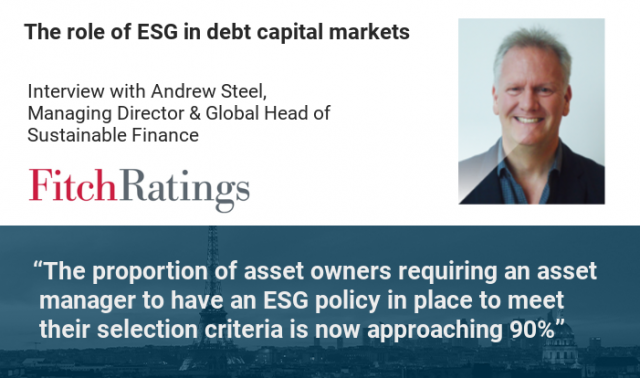Andrew Steel on the role of ESG in debt capital markets
Ahead of the Virtual Edition of the Sustainable Investment Forum Europe 2020, a 4-Part Digital Event Series starting from 8 September, we caught up with Andrew Steel, Managing Director & Global Head of Sustainable Finance at Fitch Ratings, to discuss the role of ESG in debt capital markets.

Ahead of the Virtual Edition of the Sustainable Investment Forum Europe 2020, a 4-Part Digital Event Series starting from 8 September, we caught up with Andrew Steel, Managing Director & Global Head of Sustainable Finance at Fitch Ratings, to discuss the role of ESG in debt capital markets.
Q. What is driving the speed of change and level of interest in ESG in Fixed Income Capital Markets?
There are many factors leading to increased interest from the debt capital markets in ESG, including an overall desire to be seen as an industry that is promoting “doing good” as well as “doing well”. Probably the biggest single change in the last two years has been the rapid acceleration of interest from asset owners receiving reports from asset managers about ESG performance of funds. The proportion of asset owners requiring an asset manager to have an ESG policy in place to meet their selection criteria is now approaching 90%. At the same time the proportion of asset owners starting to monitor asset managers on ESG performance metrics has increased to around 80%. This has resulted in a marked acceleration in AMs integrating ESG considerations into their investment processes over the last two years.
Q. What has Fitch been doing over the last year, and why is it important?
AMs were quite critical of the big three credit rating agencies in 2018, asking them to be more specific about how ESG factors were influencing their credit decisions at an entity and sector level. In 2019 Fitch launched its ESG Relevance Scores (ESG.RS) specifically to address this information gap. ESG.RS are now being published by Fitch for over 10,200 entities and transactions and show which specific ESG risks are influencing an issuer’s credit rating profile. Our ESG.RS templates show which ESG risks are relevant for different sectors, whilst the individual entity scores detail which of these ESG risks have risen to a level where they are influencing the rating decision, and specifically if they have led to a rating change. This is important as the Fitch scores are applied to all our publicly related entities, across all asset classes globally, consistently and transparently displaying the influence of ESG risks on credit rating outcomes. For investors we are now specifically answering the question, in a quantitative and consistently comparable approach, of how much credit risk is being picked up in our individual ratings from ESG factors.
Q. As the level of interest and information surrounding ESG continues to develop, what impact is this having on corporates?
ESG-driven allocation decisions from banks and investors are starting to affect the ability of some corporates to refinance, in some instances even driving credit rating downgrades. Survey evidence indicates that banks as well as investors are now increasingly including ESG considerations into their risk management frameworks. We believe this is starting to lead to ESG considerations ‘tilting’ the financing landscape, and would expect this trend to continue throughout 2020. Pressure on corporates to disclose more ESG information will continue to increase during 2020, and those that fall behind may find themselves increasingly penalised by their lenders.
Q. What about the bigger picture risks in the mid-term? What role is government and regulation playing in this shift towards ESG?
From a credit ratings perspective an emerging ‘climate policy gap’ poses a significant regulatory risk for both financial and non-financial corporates. The gap between government pledges to cut carbon emissions and policies currently in place highlights the potential risk of a sharp shift in the policy landscape (only a few sectors have been tackled by governments to date). Currently climate regulations have only been relevant to credit ratings for a handful of sectors, with existing policies often lacking financial impact or immediacy. Carbon pricing schemes are one of the most convenient levers for policymakers to expand the reach and impact of climate policies, and we expect to see more activity surrounding these in 2020 and the coming years.
Q. How easy will it be to implement these policy changes and what are the main obstacles?
Lack of a clear, simple and transparent global disclosure standard for corporates is one of the biggest obstacles to implementing change – it is very hard to track, measure and incentivise change without a consistent, comparable and clear way of measuring that change. There are a number of initiatives currently underway to try and tackle this issue one of the most developed of which is the EU taxonomy. We do not expect the establishment of the EU’s Taxonomy for Sustainable Activities to have credit implications in the short-term, but do believe that it could lay the foundation for a sustainable finance ecosystem to evolve around. Such activities could also become the target of policies, with more direct financial incentives if policymakers decide to take a more aggressive stance towards directing capital.
Q. Lastly, the research that Fitch has produced so far shows that out of over 143,000 ESG.RS currently being monitored and maintained, governance risks are the most influential factor for credit ratings. Do you anticipate a change in this going forwards?
In short, we feel that governance will continue to be the most influential aspect of E, S and G for credit profiles. Our initial research across our global ratings portfolio clearly shows that governance overall is the most dynamic ESG factor from a credit perspective. Since we started publication in January 2019 most changes to ESG Relevance Scores have also been related to governance issues, which is consistent with our initial findings. Interestingly, we have found a similar share of upward and downward changes in ESG Relevance Scores from governance issues since we started publishing the scores. Environmental risk issues impact credit profiles less frequently than either governance or social risk issues, but we believe that is currently linked to early stage or benign regulation of CO2 for many sectors across various countries. If regulation increases as countries try to meet their climate goals this is an area that has potential to increase substantially in significance for credit profiles.
Andrew Steel will be sharing further insights at the Virtual Edition of the Sustainable Investment Forum Europe 2020, organised in Partnership with UNEP-FI. The 4-Part Digital Event Series will take place on the 8th, 11th, 15th and 22nd September 2020. Secure your place today by registering here.




_-_frame_at_0m5s_400_250_80_s_c1.jpg)

